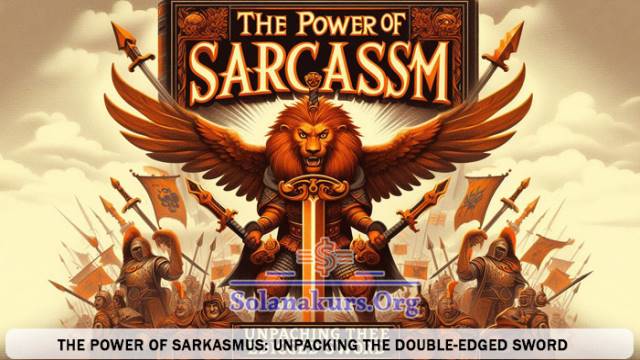The Power of Sarkasmus: Unpacking the Double-Edged Sword

Sarcasm has been around for centuries. It can be funny but it can also hurt. Sarcasm is saying one thing but meaning the opposite. It’s often used to mock or tease someone. The word “sarcasm” comes from the Greek word “Sarkasmus” which means “to tear flesh”. This definition shows how sharp sarcasm can be.
What is Sarcasm (Sarkasmus)
Sarcasm is a type of irony. But not all irony is sarcastic. Irony is when something happens that is the opposite of what you expect. Sarcasm is when someone says something but they mean the opposite. For example if it’s raining cats and dogs and someone says “What a beautiful day!” they are being sarcastic.
Sarcasm (Sarkasmus) is common in everyday conversations especially in certain cultures. Some use it to be funny. Others use it to express frustration or anger without being direct. But sarcasm can also be a way to hide true feelings. Instead of expressing hurt or disappointment a person might use sarcasm to cover it up.
The Psychology of Sarcasm (Sarkasmus)
Sarcasm can be a powerful tool in communication. It can be used to diffuse a situation, show wit or connect with others. But sarcasm can also be harmful. Studies show people who use sarcasm often have underlying feelings of hostility or aggression.
On the other hand people who understand sarcasm well are often seen as more intelligent. This is because sarcasm requires a certain level of cognitive skill. You have to understand the literal meaning of what is being said and then understand the opposite meaning. This requires quick thinking and a good sense of humor.
Sarcasm (Sarkasmus) in Different Cultures
Sarcasm is not universal. In some cultures sarcasm is common and widely understood. In others it can be seen as rude or confusing. For example in British culture sarcasm is often used in a humorous way. In contrast in some Asian cultures direct communication is valued and sarcasm (Sarkasmus) might be misunderstood or seen as disrespectful.
This cultural difference can lead to miscommunication. For example if a British person uses sarcasm with someone from a culture that doesn’t use sarcasm the other person might take the sarcastic comment literally. This can cause confusion or offense.
The Double Edged Sword of Sarcasm
Sarcasm can be a double edged sword. On one hand it can be a way to show humor and intelligence. On the other hand it can be hurtful and damage relationships. When used incorrectly sarcasm can cause misunderstandings and hurt feelings.
For example a study in Psychological Science found that sarcasm can increase creativity in the person delivering the sarcasm and the person receiving it. This is because sarcasm (Sarkasmus) requires abstract thinking which can lead to creative ideas. But the same study also found that sarcasm can lead to conflict if the person receiving the sarcasm doesn’t get it.
Real-Life Examples of Sarcasm
Let’s look at some real-life examples. In the workplace, sarcasm (Sarkasmus) can be used to lighten the mood or make a point. But it can backfire. For example if a manager says to an employee “Oh great, another one!” the employee might feel hurt or demoralized even if the manager was trying to be funny.
In relationships sarcasm can be even more toxic. For example if one partner says to the other “You’re such a genius!” after they make a mistake the other partner might feel belittled. Over time this can lead to resentment and breakdown in communication.
But sarcasm can be used positively too. For example friends might use sarcasm to tease each other in a playful way. In this case sarcasm can strengthen the bond between them. The key is to know when and how to use sarcasm.
Sarcasm in Communication
Sarcasm can have a big impact on communication. It can either enhance a conversation or kill it. The impact of sarcasm depends on the relationship and the context.
In a positive environment sarcasm can be a way to show solidarity and understanding. For example in a close knit team at work sarcasm might be used to joke about a situation without causing harm. In this case sarcasm can bring people together.
But in a negative environment sarcasm can be toxic. If there is already tension or conflict sarcasm can make it worse. This is because sarcasm can be seen as passive aggressive which can escalate the situation.
How to Deal with Sarcasm
If you’re on the receiving end of sarcasm (Sarkasmus) it can be hard to know how to respond. Here are some tips:
- Understand the Intent: Try to understand the intent behind the sarcasm. Is the person trying to be funny or are they frustrated? This will help you decide how to respond.
- Don’t Take It Personally: If the sarcasm is playful try not to take it personally. Remember sarcasm is often used as a form of humor.
- Respond Calmly: If the sarcasm is hurtful respond calmly. You can say something like “I know you’re joking but that comment hurt my feelings.”
- Set Boundaries: If someone’s sarcasm is consistently hurtful you may need to set boundaries. Let the person know their comments are not okay and ask them to stop.
When to Use Sarcasm
Sarcasm can be a useful tool but use it wisely. Here are some tips when to use sarcasm:
- Know Your Audience: Before you use sarcasm (Sarkasmus), think about your audience. Are they going to get it or will they take it the wrong way?
- Use It Sparingly: Sarcasm can lose its punch if used too much. Save it for when it will have the most impact.
- Be Aware of the Context: Consider the context you are using sarcasm in. In a tense situation sarcasm can make things worse. In a playful situation it can be more appropriate.
- Be Mindful of Tone: The tone of your voice can make a big difference when using sarcasm. A friendly tone can make sarcasm seem playful, a harsh tone can make it seem mean.
Conclusion
Sarcasm (Sarkasmus) is a powerful tool that can be good or bad. When used right it can show humor, intelligence and wit. When used wrong it can be hurtful and damaging to relationships. Knowing the impact of sarcasm and when and how to use it is key to good communication.
FAQs
What is sarcasm?
Sarcasm is when someone says one thing but means the opposite. It’s often used to mock or tease someone.
Is sarcasm always bad?
No, sarcasm can be good or bad. It depends on how and where you use it.
How do I respond to sarcasm?
If it’s playful, don’t take it personally. If it’s hurtful, respond calmly and tell them how you feel.




